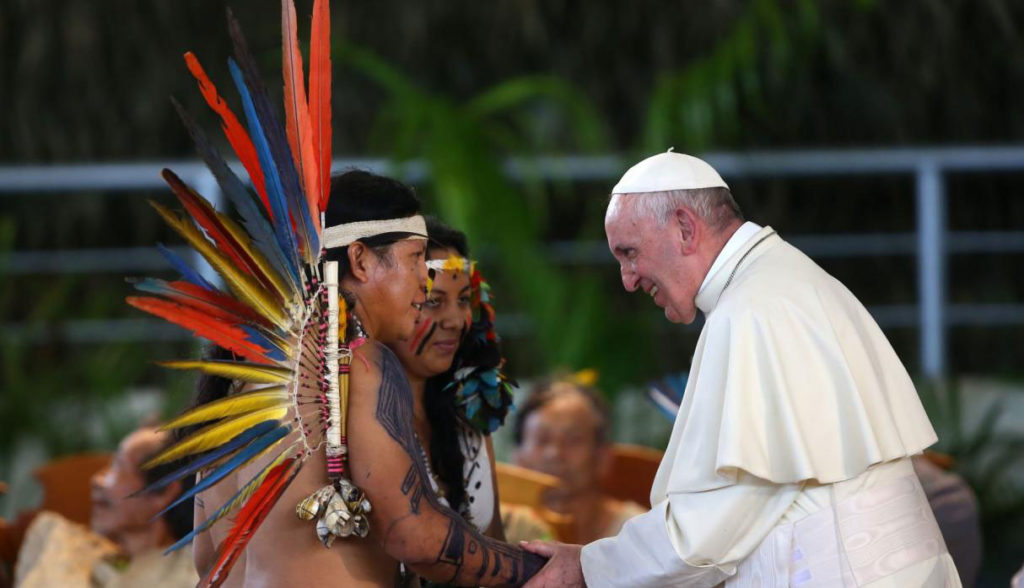WelCom October 2019:
The Special Assembly of the Synod of Bishops for the Pan-Amazon Region will meet in Rome from 6 to 27 October 2019. Pope Francis announced on 15 October 2017 that it would work ‘to identify new paths for the evangelisation of God’s people in that region’, specifically the indigenous peoples who are experiencing the destruction and exploitation of their natural environment and live ‘often forgotten and without the prospect of a serene future, also for the cause of the crisis of the Amazonian forest, lung of fundamental importance for our planet.’
Monsignor Gerard Burns
What connects the Amazon and Aotearoa?

Photo: Rodrigo Abd/Religious News
You might answer that both are important places. You might answer they both begin with the letter ‘A’. You might answer that both face the question of sustainable life on our planet.
You would be right with each of these answers. One of the great questions of our time is the care of creation, our planet, and the life it sustains. There are signs of climate breakdown, environmental degradation and increased precariousness of life for millions of people. These observations are backed by much scientific inquiry and combined study by the nations of the world via the United Nations.
In the light of this evidence and our Catholic theological and social understandings, recent Popes from Paul VI onwards have been calling us to care for the earth together with its peoples. Pope St John Paul II spoke of an ecological conversion; Benedict XVI paralleled the growing external deserts and the growing internal deserts of humanity; Pope Francis has put it at the centre of his papacy by his choice of name and his major social teaching document, Laudato Si’.
From the growing awareness of humanity as part of creation and the earth as our common home, Pope Francis has called a special synod of bishops around the care of the Amazon basin, the ‘lungs of the earth’. The synod will take place in Rome during the Mission Month of October but most of the bishops will be from the nine South American countries that have shares in the Amazon basin.
The preparation for the Synod on the Amazon has involved much consultation with the peoples of the Amazon, especially the indigenous peoples who have lived there for thousands of years and have a special connection with the natural world of the forest. Both the forest and the peoples are being threatened by massive deforestation, mining, corruption, lawlessness, drugs and prostitution.
Recently we have seen further massive destruction of the forest by fires, often started to clear land for beef farming and cropping. The current president of Brazil has wanted to open the Amazon to ‘development’ and ‘integrate’ it into the rest of Brazil. Behind this is a view that the Amazon is an unexploited resource needing to be ‘tamed’ and brought under control. This view is not confined to Brazil and has encouraged further deforestation and mining.
The Synod will look at all these issues and make a discernment – under the See-Judge-Act method featured in last month’s Social Justice Week – on how best to evangelise in that context. Some have criticised the Synod as risking the integrity of the faith, sacramental theology and Church practice.
Specific objections have been that the working document of the Synod presents the Amazon as a new source of revelation; that inculturation of the sacraments may undermine their integrity; and that engaging with an Amazonian cosmovision and eco-theology will undermine the pre-eminence of Christ as the Word incarnate and centre of God’s revelation and of the Church’s mission.
Space prevents a full reflection on these criticisms but it is true that the Scriptures (for example, Psalm 119:2-5) present creation as speaking of God. The early Church Fathers (for example, St Augustine, St John Chrysostom) spoke of the ‘two books’: two sources of God’s revelation – nature and the Bible. How we read these two books is the question.
This Synod takes place in the month of Mission, reminding us that in light of the challenges facing our world, care for creation is an integral part of how we present the love of God and the saving presence of Christ. In Aotearoa the place of the Treaty of Waitangi and our own New Zealand Church history reminds us that all evangelisation, all mission must be in dialogue with local indigenous people.